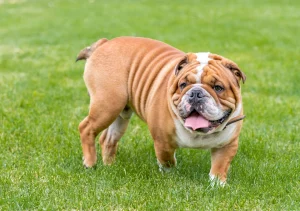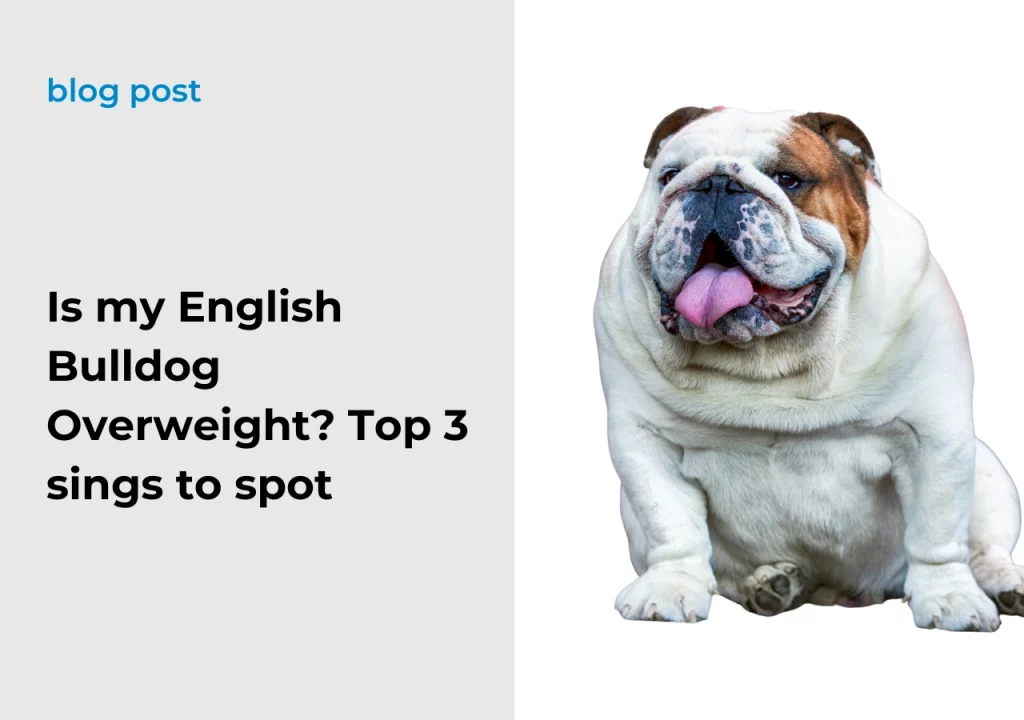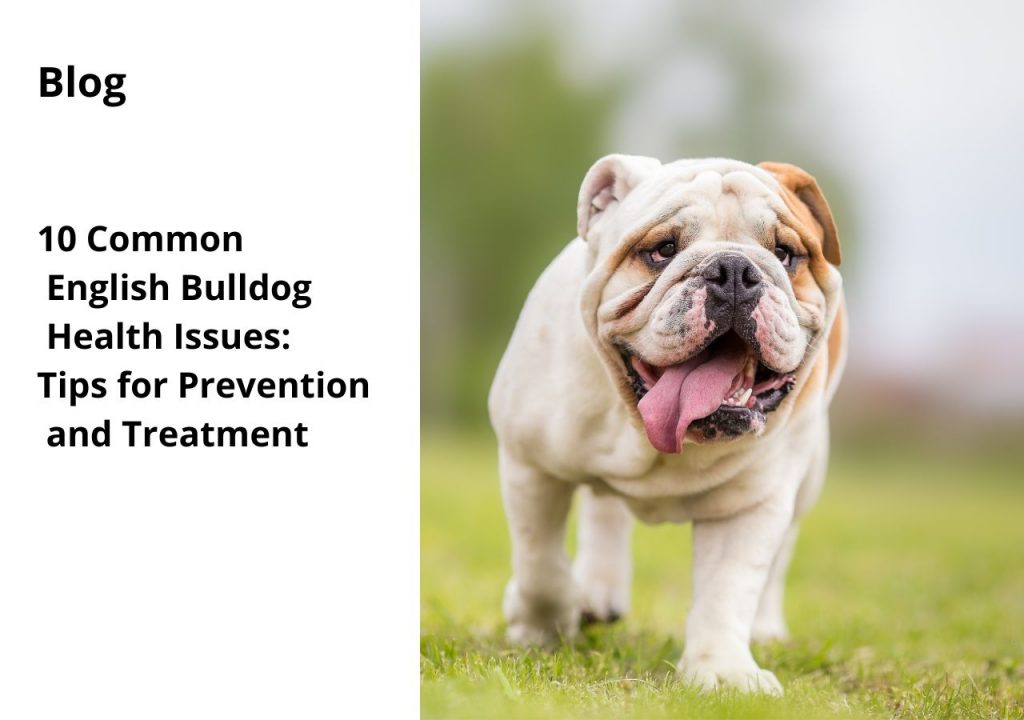How can you know is your English bulldog overweight and what can you do to help them lose some pounds and be healthy? Here are some of the best tips and advice on the matter:
English bulldogs that we all love and know are actually very easily recognized because of their distinctive body build, besides their charming personality! Still, even though we love their rough and kind of chubby look, we need to look out for their weight and make sure that they stay healthy!
Are English bulldogs fat, and why?

Just like any other dog breed, English bulldogs are prone to weight problems, and that can have significant consequences on their health and well-being. The common myth about bulldogs is that they are a chubby breed and that they are supposed to look like bulky potatoes. The truth is that they have a specific body look, with wide chests and few folds and wrinkles that can appear like they have a few extra pounds, but they certainly are not fat and shouldn’t be overweight!
British bulldogs can seem a bit chunky because of their build, but maintaining a healthy weight is very important so that they can have a happy and fulfilled life! Excess weight can have a negative impact on their health, leading to a range of issues from joint problems to heart diseases. That is why we present you the top 3 signs to look out for to determine if your English bulldog may be overweight. By spotting these signs early on, you can take some steps to make sure your furry friend stays happy and handsome!
How do you know if your bulldog is overweight?
We know that you might think that it can be hard to spot if your bulldog is overweight because they are a bit rounder than some other dog breeds, but we have some signs that can make this easier! Here is what that is all about:

Sign 1 for overweight bulldog
One of the first signs to spot if your English bulldog is overweight is through their physical appearance. Take a good look at your furry companion and take notice! English bulldogs must have a noticeable body definition! Their body should be wide at the chest and neck area but slim after the rib cage. Their waist and hips should be thin and then a bit rounder again at the back legs and tail area.
An overweight bulldog may have a noticeably rounder belly and a lack of a visible waistline! If you don’t see their ribs and they don’t have a noticeable waist – that is a sign that your bulldog pup is overweight!
Sign 2 that your bulldog has more weight than it should:
Every dog needs to scratch itself occasionally and lick or bite some itchy area, and that is expected – but if they can’t, then we have a problem! Overly thick bulldogs will not have the same mobility and agility, and scratching or just simple old grooming will be difficult and exhausting. Your once energetic bulldog may become more lethargic, preferring to nap in their cozy beds rather than engage in playtime. They can also start to have difficulties in climbing stairs or jumping onto furniture. Joint issues, such as arthritis or hip dysplasia can also become very serious problems. This is definitely a clear sign that your pup is heavier than it should be, and it is time for some changes!
Sign 3 – overweight English bulldog
English bulldogs are brachycephalic dog breeds, and that means that they have some breathing issues. Still, occasionally, hard breathing or shortness of breath after exercises are normal, but if your pup is having trouble breathing after any activity – weight is the problem! Respiratory problems can happen because of the pressure on their lungs caused by the extra weight! Obesity can also affect digestion, potentially leading to gastrointestinal issues. So, if you notice that your bulldog is panting after just a few steps and just wants to lay down and rest – check out the best diet to help them lose some weight!
What is the ideal weight for English bulldogs?

These charming and lovable creatures have a stocky build that needs careful consideration when it comes to their weight! On average, an adult male English Bulldog should weigh between 50-55 pounds (23-25 kg), while females tend to be slightly smaller at around 45-50 pounds (20-23 kg). However, you should always keep in mind that these numbers are just guidelines and can vary depending on factors such as height and overall body composition. So, if your bulldog is around this scale numbers, don’t worry, you are on the normal weight by the charts! But, if you have a doggo that has overpassed the chart line for 5 to 10 pounds (or more), it is time to change the English bulldog diet and shed some kilos down! Excess pounds can lead to various health issues like joint problems, breathing difficulties, and even heart disease. The best thing you can do to watch out for your bulldog’s weight is to regularly consult with a veterinarian to maintain your furry friend’s well-being.
How do I get my Bulldog to lose weight?

If you’re concerned about your bulldog’s weight and want to help them shed a few pounds, here are some tips to get them on the right track.
- First of all, consult with your vet to determine their ideal weight and develop a suitable diet plan. Bulldog breeds tend to have sensitive stomachs, so sticking to high-quality, low-calorie dog food is crucial. Be mindful of portion sizes and avoid excessive treats.
- To encourage exercise, try engaging your pup in daily activities such as brisk walks or play sessions that cater specifically to their needs without putting too much stress on their joints. Consistency is key; a regular exercise routine will help in both – weight loss and overall well-being. Don’t forget to provide mental stimulation through puzzle toys or training exercises as well.
- Don’t forget about water! Water will help your bulldog stay hydrated, their stomach will feel fuller when drinking enough water, and it is known that water has a great impact on the digestive tract and overall well-being of dogs!
- And lastly, shower them with love and support throughout their weight loss journey—because nothing feels better than cheering on our furry friends!
The benefits of maintaining a healthy weight for your English bulldog

Maintaining a healthy weight for your English bulldog is very important for their overall well-being and longevity. By being aware of the signs of overweight bulldogs, such as physical appearance, some behavioral changes, and health risks, you can take the necessary steps to manage your weight in the right way! Through proper portion control, a balanced diet, regular exercise, and guidance from a veterinarian, you can help your English bulldog achieve and maintain a healthy weight. By doing so, you are ensuring a happier, healthier life for your furry companion, with fewer risks and limitations. Remember, a healthy weight means a healthier and happier English bulldog and more love and affection trough the years to come!




Pingback: What Is The Best English Bulldog Bowl? Top 4 Picks So Far - English Bulldog Breed
Pingback: English Bulldog Muscle Building: Top 5 Things To Keep In Mind | English Bulldog Shop
Pingback: English Bulldog Diet for Sensitive Stomachs: Tips For Owners